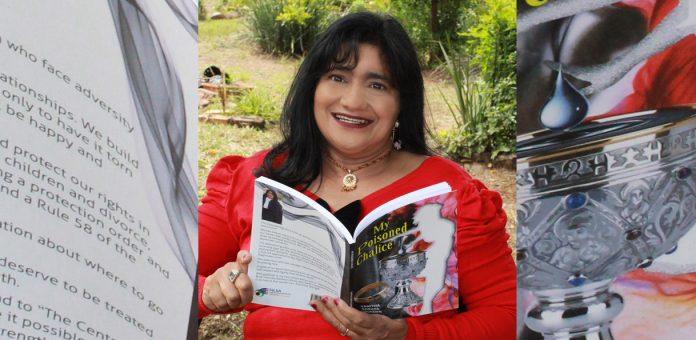Domestic or emotional abuse can happen to anyone. Young or old, rich or poor, you can find yourself in a relationship with somebody who mistreats you. Legal eagle and author Vanitha Soraya Gounden shares how her personal trauma inspired her to write a book empowering women to know their legal rights.
For more than three decades, advocate Vanitha Soraya Gounden was in an emotionally abusive relationship. Divorce was not an option, so, ever hopeful, she clung onto the marriage. Eventually, realising that she deserved so much more, she took a stand. She took her power back. And not letting her personal pain knock her down, she bounced back with force, amped to assist women to know their legal rights in various situations.
Then, with twenty-eight years expertise in different fields of the law, coupled with her own traumatic experience, she started to write her autobiography, My Poisoned Chalice.
“I decided that women needed to know that in all our diverse roles, despite domestic abuse, and ongoing and prolonged divorce processes, we can survive, and be happy. So I’ve shared my own story with the hope that in some way my journey will make a difference in someone’s life.”
Her book, which was published by the National Library, guides women in exercising and protecting their rights, in accessing legal aid, how to navigate the divorce process, children and divorce, defining domestic violence and application for maintenance in the High or Magistrates’ Court. An addendum also offers valuable info about where you can go to seek help.
“In the book, I take the reader through many themes concerning women and their challenging roles and relationships – be it with their child, teenager, daughter, sibling, mother or wife. My teenage years of petty arguments with my mum were so painful. However, as I penned down my thoughts, I realised that my mother actually loved me and only wanted the best for me.
“She taught me that women have an important place in the world. Regardless of gender or race, we can accomplish anything without relying on a man. It was during my trauma that I noticed that many women are very disempowered. So many are not aware of the legal processes I followed, so it became important to make them aware of how they could help themselves.”
Vanitha is the mother of four children – her eldest daughter is a computer engineer in the UK, her son a notary public and conveyancer attorney, her younger daughter a copy editor and graphic designer and the youngest son is a lecturer at the University of Pretoria.
Vanitha’s idea to relax and unwind is to run far distances and to conquer steep hills, just as long as she moves.
“I encourage women to enjoy walking, running, aerobics, dancing to music or yoga and not to be sedentary. Movement makes you strong for life and helps you cope with trauma.”
It is evident that there is no sitting still for Vanitha. She is already busy writing her second book, a memoir of all the cases she’s handled over the course of her career. And we cannot wait.
What exactly is domestic violence?
In terms of the Domestic Violence Act 116 of 1998, it is physical, sexual, emotional, psychological or economic abuse.
Physical abuse includes shoving, kicking, punching, slapping, throttling and biting. Domestic abuse also includes entering a person’s property without their consent, damage to property, stalking and any other behaviour which is controlling or abusive, where such behaviour causes harm or may cause harm to a person’s safety, health or well-being.
* The Domestic Violence Amendment Act 14 of 2021 which regulates protection orders affording more relief to complainants has just been signed into law.
Who to call?
• The South African Police Service will help you find medical attention, shelter and victim counselling. The emergency number is 10111. There are a number of care and counselling centres as well as safe shelters across the country who assist victims of domestic abuse. The South African Police Service will provide you with the relevant information.
• People opposed to woman abuse (Powa). They provide counselling, both over the phone and in person, temporary shelter and legal help for men and women. 011-642-4345, powa.co.za
• Childline South Africa helps abused children and their families with a free counselling service. It deals with issues such as physical and sexual abuse, substance abuse, behavioural problems and trafficking, and gives legal advice. 0800-055-555, childlinesa.org.za
• Child Welfare South Africa focuses on child protection, child care and family development. Neglect and child abuse can also be reported. 074-080-8315, childwelfaresa.org.za
Finding yourself in a domestic abuse situation? Here’s what you should do:
• Do not entertain your abuser by trying to text, email or write letters to him or her.
• Get an attorney to defend you. If you cannot afford an attorney, the Legal Aid office at your local Magistrates’ Court will assist you with obtaining one.
• Expect your abuser to get desperate. They may stalk you, or withhold child support, or threaten you physically. No matter what kind of threat they pose, take out a protection order as soon as you get the slightest suspicion that you are in physical or financial danger.
• Gather all evidence of the abuse. If you are assaulted, go to a doctor immediately after the assault in order for the doctor to record all your injuries which will be recorded on a J88 as evidence of your assault. Your evidence will assist you in obtaining a protection order.
• Your evidence of your injuries, as recorded on your J88, will assist you in criminally charging your abuser with assault or assault with intent to do grievous bodily harm (depending on the severity of your injuries) and will assist you in getting the police to arrest and detain your abuser until he appears in court before the magistrate.
• You will have to go to your local Magistrates’ Court to get assistance for your protection order.
• Get yourself and your children to a safe place as soon as you can.
• Surround yourself with a good support team who will keep your spirits up and not an unhelpful gossip group.
• Most importantly, be strong all the way. Do not give up. Endurance is key and you will get to the end.
Do try the following:
• Keep busy. Not only will this keep your mind off the trauma of separation or divorce, but it will also get you to believe in yourself.
• Keep fit. Take up running, go to the gym or simply get together with friends to take long walks. You can also exercise on your own which is extremely therapeutic. Your body will express symptoms of stress, so you need to keep your health up. Bonus is that you will also look and feel great.
• Focus on your religion or spirituality. Religious teachings also help tremendously in your healing.
• You will face overwhelming feelings of loss, regret and self-doubt about your choice to leave the abuser. Do not go back.






